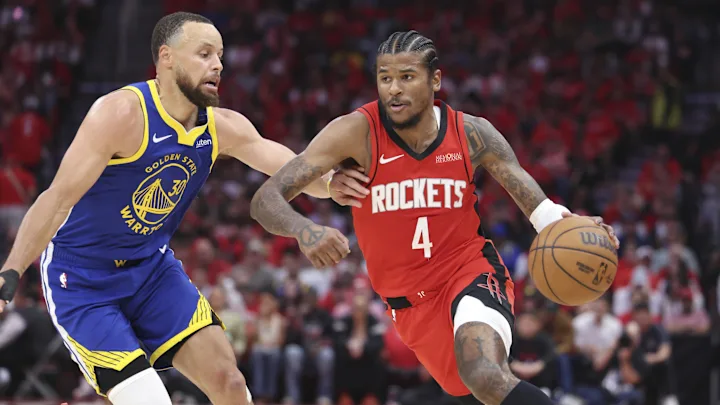
Game 2 of the NBA playoff series between the Houston Rockets and the Golden State Warriors was a thrilling matchup that offered a number of significant insights into the strategies, individual performances, and future implications for both teams. As the series heads to the next phase, this game solidified some trends while also presenting new developments that could shape the rest of the postseason. Below, we’ll break down the most crucial takeaways from the game, looking at team strategies, player performances, and what it all means moving forward.
1. James Harden’s Dominance and the Rockets’ Offensive Efficiency
One of the biggest takeaways from Game 2 was James Harden’s continued dominance in the series. After a stellar performance in Game 1, Harden once again proved why he is one of the best offensive players in the league. In Game 2, Harden finished with 35 points, showcasing his offensive versatility through his scoring and playmaking. He hit a number of tough step-back threes, got to the free-throw line with regularity, and was also able to create for his teammates.
What stood out in Game 2 was Harden’s efficiency in attacking the Golden State defense. The Warriors have one of the best defensive systems in the league, but Harden’s ability to break down their defense and get easy looks, especially in transition, highlighted a critical flaw in Golden State’s defensive setup. Houston’s offense, in general, ran through Harden, as they often do, and he orchestrated possessions with his exceptional ball-handling and court vision.
However, Harden’s performance also raises questions about whether Golden State has an answer to him, especially considering that in previous matchups, they’ve had success in slowing him down. The key takeaway is that Harden has become a consistent force, and his ability to get other players involved could be pivotal in making this series competitive.
2. Warriors’ Struggles Without Kevin Durant
While the Warriors have a loaded roster with stars like Stephen Curry, Klay Thompson, and Draymond Green, Game 2 once again revealed how much they miss Kevin Durant. Durant, who is sidelined with an injury, has been Golden State’s go-to scorer, especially when the offense bogs down or in moments of high pressure. Without Durant, Golden State’s offense seemed disjointed, and they struggled to generate consistent offensive production outside of Curry.
In Game 2, Curry put up a solid performance, scoring 31 points, but he was forced to take on a larger offensive load, which didn’t allow him to focus as much on other aspects of the game, like playmaking and defense. This imbalance was evident in the Warriors’ shot selection. They were forced to lean heavily on three-pointers, and while Curry and Thompson can hit big shots from long range, the lack of a secondary scoring option in the paint hurt them throughout the game.
The Warriors’ offensive issues without Durant were exacerbated by their struggles on defense. The Rockets took advantage of Golden State’s lack of a rim protector, scoring efficiently at the basket, especially with Clint Capela, who had a strong presence in the paint. Houston’s interior scoring put more pressure on the Warriors to adjust defensively.
While Curry and Thompson are elite shooters, without Durant’s scoring versatility, the Warriors’ offense becomes more predictable and easier to defend against. This presents a significant challenge for Golden State moving forward in the series, especially with the Rockets showing a capability to defend the perimeter while also limiting paint penetration.
3. Golden State’s Defensive Adjustments Are Necessary
In Game 1, Golden State was able to clamp down on Houston’s three-point shooting, but Game 2 revealed that the Warriors may need to adjust their defensive schemes to effectively contain the Rockets. Houston shot the ball well, especially from the three-point line, and the Warriors’ defense did not adjust quickly enough to counteract the Rockets’ offensive flow.
Golden State’s defensive scheme traditionally focuses on switching, but Houston’s unique playstyle, built around Harden and the pick-and-roll, forced the Warriors to make quick decisions, often leading to mismatches. While Draymond Green is an excellent defender, he cannot be everywhere at once, and Houston exploited the Warriors’ defensive lapses, especially in transition.
One glaring issue for the Warriors was their inability to get stops when they needed them most. With a few minutes left in the game, Golden State struggled to get key defensive stops, and this allowed the Rockets to control the tempo and extend their lead. The Warriors’ defensive breakdowns, especially against Houston’s role players, indicate that adjustments will be needed to prevent them from falling behind in the series.
A potential solution for the Warriors could be more aggressive switching and helping off-ball to stifle Harden’s playmaking. Additionally, they could work to disrupt Houston’s rhythm by crowding shooters like Eric Gordon and PJ Tucker, who have proven to be deadly from beyond the arc.
4. Clint Capela’s Impact on Both Ends of the Floor
Clint Capela’s performance in Game 2 was another significant takeaway. The Rockets’ center had an outstanding game, contributing 15 points and 14 rebounds while also making his presence felt defensively. Capela’s rebounding ability gave the Rockets extra possessions, and his shot-blocking at the rim was vital in deterring the Warriors’ attempts at attacking the paint.
On the offensive end, Capela’s ability to finish at the rim, particularly off of lobs from Harden, was crucial in keeping the Warriors’ defense on its heels. His screens and rolls to the basket were effective in creating open driving lanes for Harden and Gordon. While Capela is not an elite scorer, his presence inside has been a key asset for the Rockets, giving them a strong rim protector and a reliable target in pick-and-roll situations.
For the Warriors, stopping Capela in the paint has become a focal point. Golden State’s lack of size without Durant meant that they couldn’t afford to let Capela dominate the paint, but their inability to slow him down raised questions about their ability to protect the rim and rebound effectively. This will likely remain a key issue in the series, as Capela’s rebounding and rim protection can significantly impact Golden State’s ability to score efficiently.
5. The Rockets’ Supporting Cast Rising to the Occasion
Another big takeaway from Game 2 was the excellent play of the Rockets’ supporting cast. While Harden remained the focal point of the offense, players like Eric Gordon, PJ Tucker, and even Austin Rivers stepped up in significant moments. Gordon had 24 points, and his ability to knock down clutch three-pointers helped the Rockets maintain momentum throughout the game. Tucker also provided his usual defensive presence and crucial shooting from beyond the arc.
The Rockets have always relied on Harden, but when their role players contribute at a high level, they become a much more dangerous team. The fact that the Rockets were able to win convincingly with such a balanced offensive output showed that Houston’s depth could be a key advantage in the series. For Golden State to stay competitive, they must find ways to limit the effectiveness of these secondary contributors.
6. The Series Shifts in Favor of Houston
After the Rockets’ Game 2 win, it’s clear that they’ve gained momentum heading into the rest of the series. The Rockets have shown they can play with the Warriors and exploit their weaknesses, particularly without Durant. Houston’s offensive execution, combined with their defensive effort, positions them well for the remainder of the series.
Golden State has their work cut out for them. If Durant is unable to return, the Warriors will need Curry and Thompson to play at an elite level, and they will need significant contributions from their bench. However, without Durant, Golden State’s margin for error is much smaller.
The biggest takeaway from Game 2 is that the Rockets have proven they can beat the Warriors at their own game, and with the series tied, they will likely feel more confident going forward. If Golden State can’t adapt, Houston could very well take control of this series in the coming games.
In the end, Game 2 of the Rockets-Warriors series provided us with a lot of food for thought. Harden’s brilliance, the Warriors’ struggles without Durant, Capela’s dominance inside, and the Rockets’ depth all contributed to a memorable game. As the series progresses, adjustments will need to be made by both teams. Golden State will need to shore up their defense and find ways to fill the scoring void left by Durant, while Houston will continue to ride the momentum they’ve gained from this win.
Ultimately, the key takeaway is that this series is far from decided. With a couple of games left, anything can happen, but if the trends from Game 2 continue, we may be looking at a surprising shift in the balance of power in the West.





